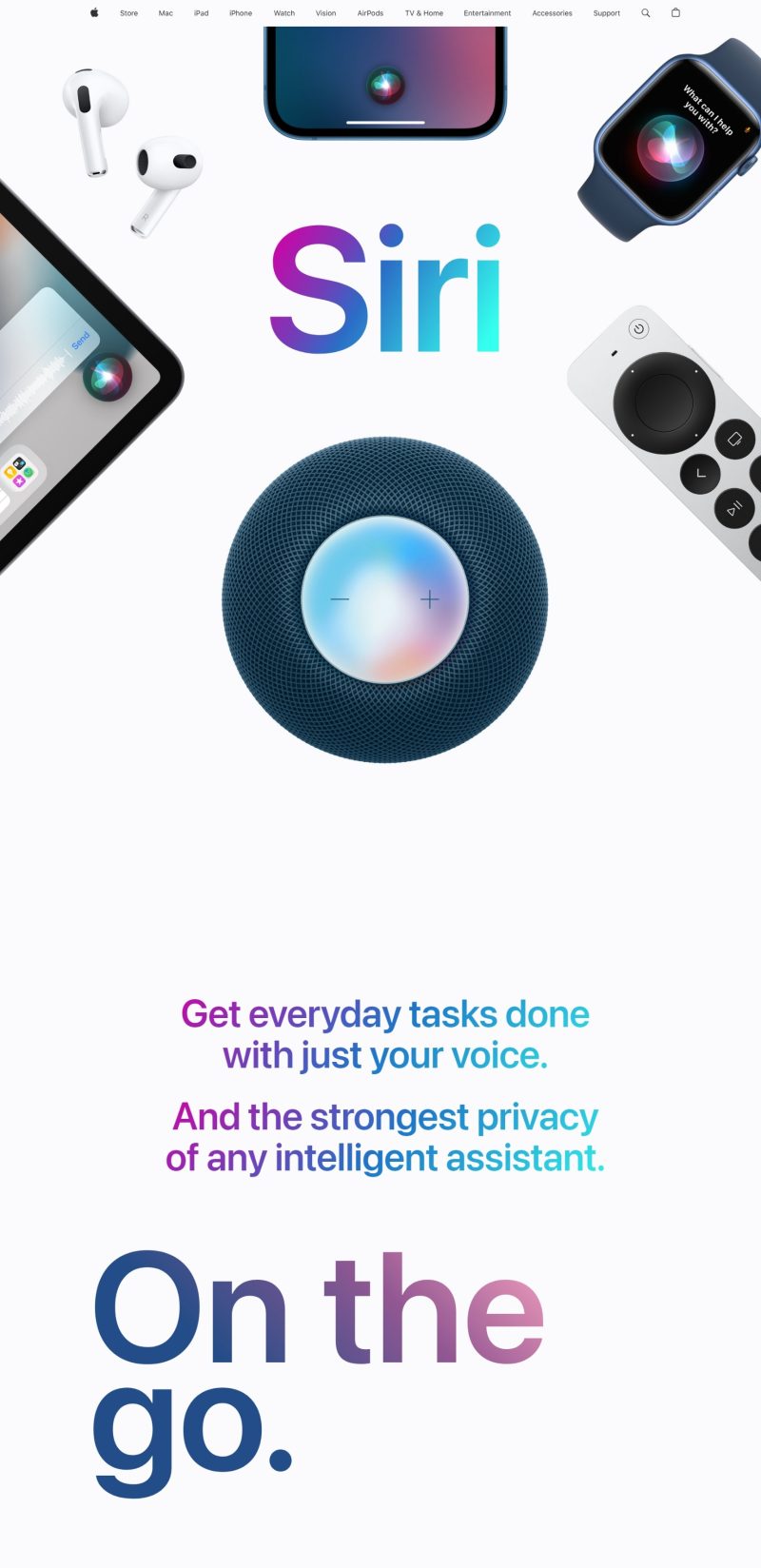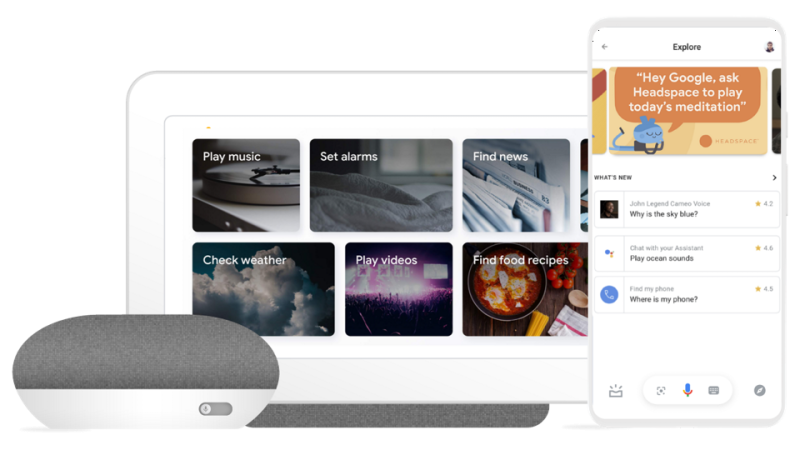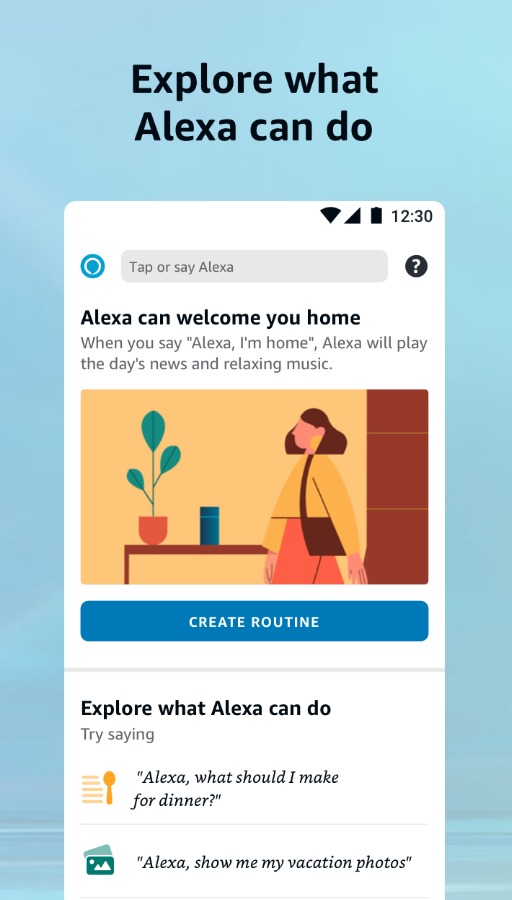“Close the window!” spoken to an AI assistant will mean something different when working in a word processor and something different when sitting in a cool room of a smart office. The words “Remind me to send a message to my partner when I get home” mean something different depending on who is saying them. The question “Will I need an umbrella today?” requires the association of umbrella use with rainy weather. However, the purpose of a virtual assistant is not only to understand commands and questions but first and foremost to take action. Answering, whether by voice or by following command, requires a process no less complex than understanding the question asked. After all, a virtual assistant is a computer program that’s made to behave like a human being.
AI virtual assistant - table of contents
- What is an AI assistant?
- How can an AI assistant help your business?
- Apple Siri - business applications of the virtual assistant
- Google Assistant - AI assistant for business
- Amazon Alexa - AI for enterprise
- Siri, Alexa or Google Assistant - Which one to hire for your business?
- Summary. The future of AI assistants in business
What is a virtual assistant?
Modern business is increasingly relying on technology, and virtual assistants based on artificial intelligence are becoming an integral part of this ecosystem. An AI virtual assistant, or a computer program that can perform tasks for us, is not only a tool to make everyday work more manageable but also a key to future success. But how exactly can these tools help your business?
A virtual assistant based on artificial intelligence is a so-called software agent. This is because it is a program that can perform various tasks or services for a user based on data provided to it, such as a contact list or default applications, commands or questions, including voice. Such technologies often feature the capabilities of chatbots and voicebots to simulate human conversation to facilitate interaction with users.
An example is when an entrepreneur has an AI assistant to automatically schedule meetings with clients. This saves time that can be devoted to other, more complicated tasks.
Virtual assistants have already become an integral part of the AI business ecosystem, enabling employees to perform a wide range of tasks – from scheduling meetings to organizing work to automating monotonous daily tasks. The AI-based virtual business assistant is thus no longer just a futuristic vision, but a reality that is transforming the way business is conducted.
Apple’s Siri, Google Assistant, and Amazon Alexa virtual assistants are becoming not only our helpers but also critical tools in the development of companies. But how exactly can these tools help your business?
How can an AI virtual assistant help your business?
AI virtual assistants are known for their versatile applications. They work well in both organizing private affairs and running a business. Some of the most important business applications include:
- Task automation – AI assistants can automatically perform routine tasks such as booking appointments, reminding people of deadlines, or answering frequently asked customer questions.
- Personalizing customer interactions – With the ability to analyze data and learn from previous interactions, AI assistants can provide personalized responses and recommendations to customers.
- Team support – Google Assistant can help employees organize their day, reminding them of upcoming meetings or helping them quickly access the information they need.
- Integration with other tools – AI Assistants can be integrated with other business tools, such as CRM and project management systems.
- 24/7 Availability – AI assistants are available around the clock, which means your customers can receive support at any time.
- Product development – Integrating a digital product or smart device with AI assistants can bring many benefits. For example, if your company offers bright lighting, integration with Alexa will allow customers to control the lights with voice commands. This makes the product more attractive and functional for users.
Apple Siri – business applications of the virtual assistant
The invocation “Hey Siri!”, the voice command that activates the AI assistant from Apple, has even lived to hear a song with that title sung by Salemilese. Siri is available on iPhones, iPads, Macs, Apple Watch and HomePod. By integrating with other apps and services on Apple devices, Siri can help perform various business tasks. For example, an entrepreneur can ask Siri to remind him of an upcoming client meeting or to check the weather before an important business trip. Siri can also help automate tasks such as sending messages to a team or booking a conference room using voice commands.

Google Assistant – AI assistant for business
Google Assistant has 500 million users worldwide. Available on Android devices, smart speakers and smart displays, it offers a wide range of functions.
For businesses, Google Assistant can help organize work by providing traffic information before an important meeting or supporting you in quickly accessing business data. For example, if your company works with Google Workspace, Assistant can help you organize meetings, search emails or create documents through voice commands.

Amazon Alexa – AI for enterprise
Alexa, the popular AI assistant from Amazon, premiered in 2014. It can perform simple calculations and answer questions about general topics. It is known for its voice interactions and real-time information delivery. It is designed to work with Amazon devices, including Echo and Fire TV.
Alexa can help companies automate various tasks, such as controlling smart devices in the office or providing up-to-date market information. For example, Alexa can be used in hotels to automatically control lighting or air conditioning in guest rooms. In addition, Alexa can integrate with various business applications to better organize work and communicate with customers.

Siri, Alexa or Google Assistant – Which virtual assistant should you hire for your business?
Choosing the right AI assistant can be crucial to the success of your business. Each has its unique features that may be more or less useful in different business contexts. Here’s a comparison of the three most popular AI assistants – Siri, Alexa and Google Assistant.
- Responsiveness – Alexa requires specific phrases to be understood, while Google Assistant does better with context. Siri is known for its natural language processing, which allows for a more “human” conversation.
- Skills and actions – Alexa has a wide range of “skills” that can be added, while Google Assistant offers “actions.” While Alexa has more skills, Google Assistant provides more advanced features, such as language translation and appointment booking.
- Knowledge base – Alexa draws from a variety of sources, such as IMDb and Wikipedia, while Google Assistant uses Google Search, giving it access to a vast amount of information.
- Multilingualism – Siri supports more languages than Alexa, offering a more comprehensive experience for users who speak languages other than English.
- Integrated services – Both Alexa and Google Assistant offer integration with a variety of services, such as music inclusion and search, video playback, or even recurring shopping, which can come in very handy for a company that regularly replenishes merchandise.
- Integrated devices – Google Assistant is built into many third-party devices, while Siri is only available on Apple devices. Alexa is available on Amazon devices, but also on some Android phones and smart speakers. This is worth keeping in mind when choosing a universal AI assistant for business.
- Differences in performance – Google Assistant is more accurate and offers better integration with IFTTT, while Siri is more “conversational” and handles natural language processing better.
So how do you choose the best AI assistant? If you have an Android device and care about accuracy, Google Assistant may be the best choice for you. If you use Apple and care about natural language processing, go for Siri. If you have an Amazon device and want to take advantage of shopping on Amazon, choose Alexa.

Summary. The future of AI assistants in business
As technology evolves, AI assistants will play an increasingly important role in the business world. They are expected to offer increasingly sophisticated functions, such as emotion recognition, smart device support, and increasingly complex interactions with customers.
For companies that want to be at the forefront of innovation, investing in AI technology and virtual assistants will be critical to future success.
If you like our content, join our busy bees community on Facebook, Twitter, LinkedIn, Instagram, YouTube, Pinterest.
Author: Robert Whitney
JavaScript expert and instructor who coaches IT departments. His main goal is to up-level team productivity by teaching others how to effectively cooperate while coding.
AI in business:
- Threats and opportunities of AI in business (part 1)
- Threats and opportunities of AI in business (part 2)
- AI applications in business - overview
- AI-assisted text chatbots
- Business NLP today and tomorrow
- The role of AI in business decision-making
- Scheduling social media posts. How can AI help?
- Automated social media posts
- New services and products operating with AI
- What are the weaknesses of my business idea? A brainstorming session with ChatGPT
- Using ChatGPT in business
- Synthetic actors. Top 3 AI video generators
- 3 useful AI graphic design tools. Generative AI in business
- 3 awesome AI writers you must try out today
- Exploring the power of AI in music creation
- Navigating new business opportunities with ChatGPT-4
- AI tools for the manager
- 6 awesome ChatGTP plugins that will make your life easier
- 3 grafików AI. Generatywna sztuczna inteligencja dla biznesu
- What is the future of AI according to McKinsey Global Institute?
- Artificial intelligence in business - Introduction
- What is NLP, or natural language processing in business
- Automatic document processing
- Google Translate vs DeepL. 5 applications of machine translation for business
- The operation and business applications of voicebots
- Virtual assistant technology, or how to talk to AI?
- What is Business Intelligence?
- Will artificial intelligence replace business analysts?
- How can artificial intelligence help with BPM?
- AI and social media – what do they say about us?
- Artificial intelligence in content management
- Creative AI of today and tomorrow
- Multimodal AI and its applications in business
- New interactions. How is AI changing the way we operate devices?
- RPA and APIs in a digital company
- The future job market and upcoming professions
- AI in EdTech. 3 examples of companies that used the potential of artificial intelligence
- Artificial intelligence and the environment. 3 AI solutions to help you build a sustainable business
- AI content detectors. Are they worth it?
- ChatGPT vs Bard vs Bing. Which AI chatbot is leading the race?
- Is chatbot AI a competitor to Google search?
- Effective ChatGPT Prompts for HR and Recruitment
- Prompt engineering. What does a prompt engineer do?
- AI Mockup generator. Top 4 tools
- AI and what else? Top technology trends for business in 2024
- AI and business ethics. Why you should invest in ethical solutions
- Meta AI. What should you know about Facebook and Instagram's AI-supported features?
- AI regulation. What do you need to know as an entrepreneur?
- 5 new uses of AI in business
- AI products and projects - how are they different from others?
- AI-assisted process automation. Where to start?
- How do you match an AI solution to a business problem?
- AI as an expert on your team
- AI team vs. division of roles
- How to choose a career field in AI?
- Is it always worth it to add artificial intelligence to the product development process?
- AI in HR: How recruitment automation affects HR and team development
- 6 most interesting AI tools in 2023
- 6 biggest business mishaps caused by AI
- What is the company's AI maturity analysis?
- AI for B2B personalization
- ChatGPT use cases. 18 examples of how to improve your business with ChatGPT in 2024
- Microlearning. A quick way to get new skills
- The most interesting AI implementations in companies in 2024
- What do artificial intelligence specialists do?
- What challenges does the AI project bring?
- Top 8 AI tools for business in 2024
- AI in CRM. What does AI change in CRM tools?
- The UE AI Act. How does Europe regulate the use of artificial intelligence
- Sora. How will realistic videos from OpenAI change business?
- Top 7 AI website builders
- No-code tools and AI innovations
- How much does using AI increase the productivity of your team?
- How to use ChatGTP for market research?
- How to broaden the reach of your AI marketing campaign?
- "We are all developers". How can citizen developers help your company?
- AI in transportation and logistics
- What business pain points can AI fix?
- Artificial intelligence in the media
- AI in banking and finance. Stripe, Monzo, and Grab
- AI in the travel industry
- How AI is fostering the birth of new technologies
- The revolution of AI in social media
- AI in e-commerce. Overview of global leaders
- Top 4 AI image creation tools
- Top 5 AI tools for data analysis
- AI strategy in your company - how to build it?
- Best AI courses – 6 awesome recommendations
- Optimizing social media listening with AI tools
- IoT + AI, or how to reduce energy costs in a company
- AI in logistics. 5 best tools
- GPT Store – an overview of the most interesting GPTs for business
- LLM, GPT, RAG... What do AI acronyms mean?
- AI robots – the future or present of business?
- What is the cost of implementing AI in a company?
- How can AI help in a freelancer’s career?
- Automating work and increasing productivity. A guide to AI for freelancers
- AI for startups – best tools
- Building a website with AI
- OpenAI, Midjourney, Anthropic, Hugging Face. Who is who in the world of AI?
- Eleven Labs and what else? The most promising AI startups
- Synthetic data and its importance for the development of your business
- Top AI search engines. Where to look for AI tools?
- Video AI. The latest AI video generators
- AI for managers. How AI can make your job easier
- What’s new in Google Gemini? Everything you need to know
- AI in Poland. Companies, meetings, and conferences
- AI calendar. How to optimize your time in a company?
- AI and the future of work. How to prepare your business for change?
- AI voice cloning for business. How to create personalized voice messages with AI?
- Fact-checking and AI hallucinations
- AI in recruitment – developing recruitment materials step-by-step
- Midjourney v6. Innovations in AI image generation
- AI in SMEs. How can SMEs compete with giants using AI?
- How is AI changing influencer marketing?
- Is AI really a threat to developers? Devin and Microsoft AutoDev
- AI chatbots for e-commerce. Case studies
- Best AI chatbots for ecommerce. Platforms
- How to stay on top of what's going on in the AI world?
- Taming AI. How to take the first steps to apply AI in your business?
- Perplexity, Bing Copilot, or You.com? Comparing AI search engines
- ReALM. A groundbreaking language model from Apple?
- AI experts in Poland
- Google Genie — a generative AI model that creates fully interactive worlds from images
- Automation or augmentation? Two approaches to AI in a company
- LLMOps, or how to effectively manage language models in an organization
- AI video generation. New horizons in video content production for businesses
- Best AI transcription tools. How to transform long recordings into concise summaries?
- Sentiment analysis with AI. How does it help drive change in business?
- The role of AI in content moderation


















